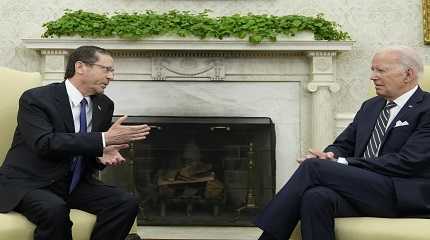
NEW YORK (AP) — As President Joe Biden prepares to meet Israeli Prime Minister Benjamin Netanyahu this week in New York, a new poll finds that while Americans generally view Israel as a partner or ally, many question whether his far-right government shares American values.
The poll results from The Associated Press-NORC Center for Public Affairs Research and the meeting come during a new period of tension between the Biden administration and Israel. Those tensions are caused by Netanyahu’s proposed judicial overhaul that has sparked mass protests in major Israeli cities, ongoing disagreements over how to deal with Iran and how to approach the Palestinians, and comments from Netanyahu political allies that have irked U.S. officials.
Despite the friction, Biden, who spoke out in barely disguised opposition to the judicial plan, and Netanyahu are expected to project a solid partnership in which the U.S. continues to support Israel’s security.
Biden will also emphasize that the U.S. is continuing to work on expanding the Trump-era Abraham Accords, which normalized Israeli relations with several Arab countries, to include Saudi Arabia. However, there is little sign of an imminent breakthrough on that front.
Although the poll showed that Americans overwhelmingly view Israel as more of a friend than a foe, it also found that they are divided on whether Israel is a country with which the U.S. shares common interests and values.
About 4 in 10 Americans described Israel as a partner with which the U.S. should cooperate, but they also said the country does not share U.S. interests and values, the poll found. Only about 3 in 10 said Israel is an ally that shares U.S. interests. Republicans (44%) are more likely than Democrats (25%) to call Israel an ally with shared values. About 2 in 10 Americans described Israel as either a U.S. rival or an adversary.
The U.S. provides Israel with more than $3 billion a year in military and other assistance and the close relationship has endured over the decades despite not infrequent spats over policy, most notably over Iran and treatment of the Palestinians.
Overall, 61% of Americans disapprove of how Biden is handling the Israeli-Palestinian conflict, with only 35% approving. That number was slightly lower than Biden’s overall approval rating.
Many Americans don’t see a need for the U.S. to change its position in the Israeli-Palestinian conflict. About 4 in 10 Americans, or 44%, said the U.S. gives about the right amount of support to Israel in the conflict, while 27% said it’s too supportive of Israel and 23% not supportive enough.
About the same percentage, 42%, say the correct amount of support is given to the Palestinians, with 30% saying they want more support and 21% wanting less.
Among Republicans, 34% said they would like the U.S. to give more support to Israel, but slightly more (40%) say the current level is sufficient. Only 11% of Democrats said the U.S. needs to be giving more assistance to Israel. About half of Democrats said the current amount is “about right” while only about a third said the U.S. is too supportive of Israel, the poll found.
In their meeting Wednesday, Biden is expected to reaffirm steadfast American commitment to Israel’s security in the turbulent Middle East. At the same time, his administration is hoping to give Netanyahu one of his major asks — entry into the U.S. Visa Waiver Program, which would allow Israelis to visit the United States on a temporary basis without a visa.
U.S. law requires that Americans, including Palestinian-Americans, be treated the same in order to qualify for the program. Israel has taken several steps to ensure equal treatment for all Americans entering Israel but it has only until the end of September to prove that the criteria have been met. Otherwise, Israel must requalify for the program during the next budget year, which begins Oct. 1.
In terms of the Palestinian conflict, about two-thirds of Americans profess neutrality, according to the AP-NORC poll — 37% said they sympathize with neither Israel nor the Palestinians, while 29% said they sympathized with both equally.
A similar percentage, 58%, said they neither favor nor oppose the creation of a Palestinian state, while 22% favor it and 15% oppose it.




